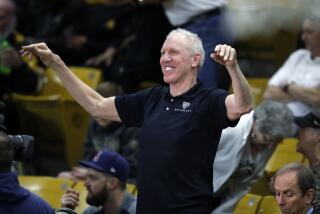Seton Hall’s Wake-Up Call Catches Duke in Deep Sleep
SEATTLE — After 10 minutes of college basketball that set the sport back about 50 years, CBS television producers must have considered running a promotional announcement that went: “NCAA Action--It’s Not Exactly Fantastic!” Their presentation of Seton Hall vs. Duke resembled something on the order of the Clippers vs. the Miami Heat. It was a Game of the Weak. It was basketball without baskets.
Clank, clank, clank went the Pirates. More than three minutes it took them to score a point. Nearly four minutes to make a basket. Nearly nine minutes to make two baskets. Nearly 12 minutes to reach double figures. No Hall team had done this poorly in a national tournament game at Seattle since . . . well, since Joe B.’s. Remember that Kentucky stink bomb of 1984, when it played Georgetown for 40 minutes and scored 40 points? Bad, right? Hey, this was worse.
P.J. Carlesimo, coach of Seton Hall, had the worst seat in the hall. He was right there at courtside, forced to watch as his ballclub fell behind, 26-8.
As his Australian import, Andrew Gaze, said: “We were in diabolical trouble.”
Doy-abolical trouble, was how he said it. We don’t actually use such a phrase Up Over, Andrew, but we like it, just the same. Yes, Yanks, the Seton Hall lads were in diabolical trouble. They were just a bunch of shrimps, and Duke was throwing them on the barbie.
Only suddenly, without warning, P.J. and the Pirates started doing a good and proper job on the sloppy, flopping Blue Devils. One minute Seton Hall was down by 18 points, and next thing anybody knew, it was ahead by 19. Ta-da! Your typical, basic, 37-point turnabout. All the Dookies could do was just stand there, wondering what the devil happened to that big lead of theirs. It was gone, gone with the win.
We would have bet some serious U.S. dollars that Seton Hall could have scrimmaged by itself all afternoon and not scored 95 points, the way things began, but somehow the Pirates got hot and took Saturday’s game, 95-78, progressing to Monday night’s fight for the national championship. Make that international championship, if you like, since this was the first American college game ever telecast to Australia.
Gaze got 20 points to lead the winners, and afterward said he was very glad that he put up with all those insults from his mates back on the sub-continent.
“When I was 8 or 9 years old, I was considered a sissy, a girl, for playin’ a women’s game,” Gaze said.
Was a time, Andrew said, he played in places that made the Kingdome look like the Taj Mahal.
“Primitive, very primitive,” he said. “No one would come to see you play, no stands, no heating, no air-conditioning, bad nets on the baskets. Just your very basic tent shed with a floor.”
Australian Rules Basketball. Last man standing, wins.
Well, let’s hear it for exchange students, then. Once there were Africans, such as Akeem Olajuwon, to rave about at the NCAA finals. Now, Australians. This Aussie turned out to be a lethal weapon for Seton Hall. So what if he pronounces it “boss-kit-ball.” So what if he starts most of his sentences with: “Loyk I said.” The kid can play. The kid from down under plays up over the rim.
And now here he is in the national title game, and it’s not even his nation. Poor old Danny Ferry of Duke gets to the Final Four three times in four years, and goes to the pros without a championship to show.
Seton Hall has turned out to be the king-size surprise of college basketball, 1989, for a lot of reasons. Representative of the Big East, this team is doing pretty darn well up here in the Big Northwest, too. The Pirates convinced themselves they could be great by winning the Great Alaskan Shootout at the beginning of the season, and now they have made it all the way to the final night without having lost a game to anybody outside the Big East Conference.
“You always say you think you can win,” Carlesimo said. “But to have thought we could win the national title before the season, we’d have had to be a little bit touched in the head.
“From Alaska on, though, things changed for us. That’s what convinced us we might just be good enough. Being confident based on something is different than being confident based on nothing. From that day on, we started saying it out loud, even saying some dumb things, like that we felt we could win the national championship.
“Amazing. We can. “
More to Read
Go beyond the scoreboard
Get the latest on L.A.'s teams in the daily Sports Report newsletter.
You may occasionally receive promotional content from the Los Angeles Times.










